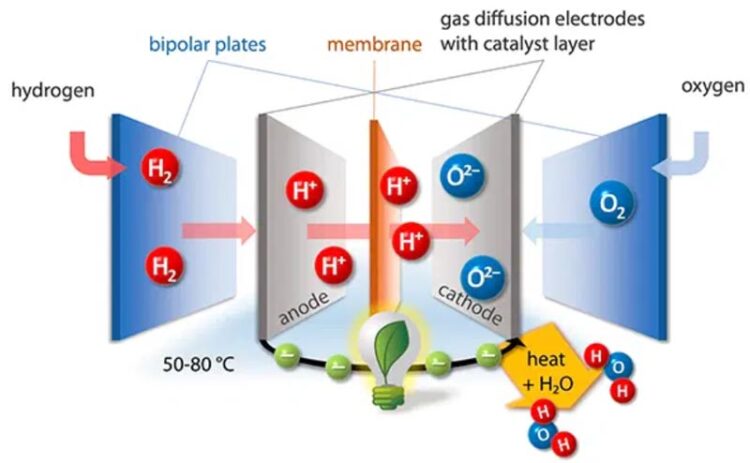Internationalisation of sustainable hydrogen technology

Functional diagram of a PEM fuel cell.
(c) Andreas Rosin, University of Bayreuth
Green hydrogen and fuel technology are a new focus of the Export Initiative Environmental Technologies (EXI). The University of Bayreuth has recently become involved in this funding programme of the Federal Ministry for the Environment, Nature Conservation, Nuclear Safety and Consumer Protection (BMUV) with its “ECO-FCGen – decentralized power generator based on fuel cells” project. The aim of the project is to build two electricity generation prototypes based on green hydrogen in Germany and India. Research partners are CBC GmbH & Co. KG in Ibbenbüren and the Fraunhofer Institute for Manufacturing Engineering and Automation (IPA) in Stuttgart.
Media Contact
All latest news from the category: Power and Electrical Engineering
This topic covers issues related to energy generation, conversion, transportation and consumption and how the industry is addressing the challenge of energy efficiency in general.
innovations-report provides in-depth and informative reports and articles on subjects ranging from wind energy, fuel cell technology, solar energy, geothermal energy, petroleum, gas, nuclear engineering, alternative energy and energy efficiency to fusion, hydrogen and superconductor technologies.
Newest articles

Silicon Carbide Innovation Alliance to drive industrial-scale semiconductor work
Known for its ability to withstand extreme environments and high voltages, silicon carbide (SiC) is a semiconducting material made up of silicon and carbon atoms arranged into crystals that is…

New SPECT/CT technique shows impressive biomarker identification
…offers increased access for prostate cancer patients. A novel SPECT/CT acquisition method can accurately detect radiopharmaceutical biodistribution in a convenient manner for prostate cancer patients, opening the door for more…

How 3D printers can give robots a soft touch
Soft skin coverings and touch sensors have emerged as a promising feature for robots that are both safer and more intuitive for human interaction, but they are expensive and difficult…





















